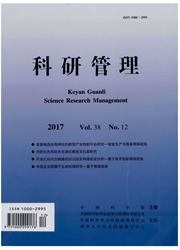

 中文摘要:
中文摘要:
本研究基于关系型债权人视角,阐释了创新激励二元性特征及其在债权治理和创新绩效的路径作用,并将产权性质纳入整合分析框架,对产权性质在债权治理、创新激励二元性与创新绩效关系的调节作用展开探讨,全面揭示了债权治理对创新绩效的作用机理。研究发现:中国本土情境下,商业银行具有典型的关系型债权人特征,银行债权治理作用能够显著促进企业创新绩效;约束性激励在债权治理与创新绩效关系中具有显著中介作用,而鼓励性激励的中介效应并不显著;产权性质在二者关系中具有显著调节作用,国有持股比例越高,债权治理机制产生的约束性激励越发不明显,创新绩效越低。本文研究结论有利于在创新激励视角下拓展债务异质理论,并能够为企业创新融资实践提供重要科学依据。
 英文摘要:
英文摘要:
Debt heterogeneity theory has offered a new perspective to explain the relationship between debt financing and firms' technological innovation under the fierce competition environment. The duality property of innovation incentive has been first put forward by this paper, based on the mediation effect of these two types of innovation incentive between banks' governance and innovation performance has been tested from the perspective of relational creditor. The moderation effect of property right has also been studied so as to explore the function border of banks' governance towards innovation performance. It is found out that commercial banks in China have shown typical features as relational creditor, and its governance mechanism can boost debtors' innovation performance through mediation effect of constraining innovation incentive. While the mediation effect of encouraging incentive is not significant. Furthermore, property right can significantly moderate the relationship between creditors' governance and innovation performance. Along with increasing of equity ratio of state - owned shares, there is less constraining incentive generated by creditors' governance mechanism, and its boost effect upon innovation performance is consequently weakened. The results in this study will be beneficial to expand the debt heterogeneity theory from the perspective of innovation incentive, and provide important scientific basis for the firms' innovative financing practices.
 同期刊论文项目
同期刊论文项目
 同项目期刊论文
同项目期刊论文
 期刊信息
期刊信息
